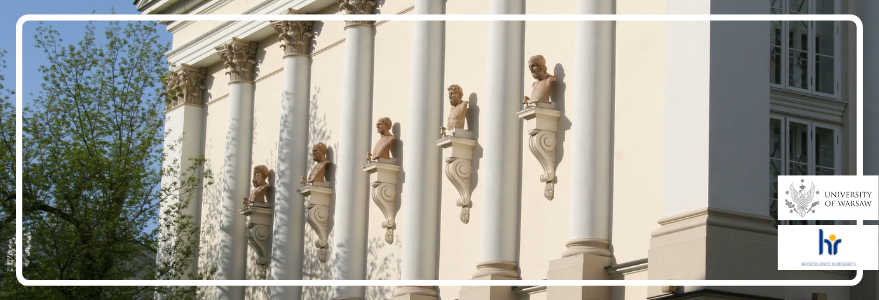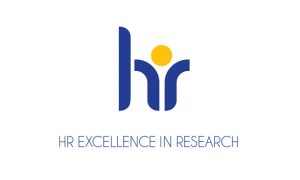Supporting researchers in the development of their research careers, introducing good practices in the recruitment of staff, setting up international research teams, providing training, and a system for internal grants; thanks to the “Excellence Initiative – Research University” Programme, the University of Warsaw increases the quality of its scientific and educational activities, in compliance with the objectives of the Human Resources Strategy for Researchers. It also contributes to the increasing internationalisation of the university.
The first competition under the “Excellence Initiative – Research University” programme was conducted by the Ministry of Science and Higher Education (now: Ministry of Education and Science) in 2019. Twenty universities applied to participate, 10 of which – including the University of Warsaw (1st place) – were awarded the research university status. The successful participants receive additional funding between 2020 and 2026.
The UW in the IDUB Programme implements a total of 70 actions, about half of which are in the five Priority Research Areas (the POBs). The remainder are horizontal actions, predominantly implemented by the university-wide administrative units.
The IDUB Programme’s achievements to date include:
- setting up international and national research teams: under Actions I.3.4. “Creation of three research teams that will initiate development of scientific networks conducting studies in the area of diseases of affluence, emerging pollutants and the circular economy” three research team leaders (Dr Dominika Buchberger from the Faculty of Chemistry, Dr Anna Malik from the Faculty of Biology, and Dr Kenneth De Baets from the Faculty of Biology) were selected in the international recruitment process and awarded a budget of more than PLN 3 million each. Meanwhile, a series of “New Ideas” competitions contributes to the creation of interdisciplinary teams with researchers representing all stages of their scientific career (with a programme dedicated to young researchers). To date, approximately 300 applications have been assessed. In the 2nd edition, there were separate tracks for experienced researchers, who are more than 7 years post-doctoral, as well as those at the beginning of their career, up to 7 years post-doctoral. The amount of funding was PLN 30-150 000. Another edition of the competition is planned.
- support for researchers in their career development: the programme is currently testing a Performance Review tool, obtained through collaboration with the universities from the 4EU+ Alliance Participants in the project receive one-to-one mentoring and training geared toward young researchers, benefit from individual career counselling and a platform for mutual communication, and can also receive funding for a research/conference trip. Mentors, on the other hand, are provided with a workshop during which methods of working with young researchers are developed. They are also provided access to a peer-to-peer communication platform and the necessary materials. As part of career development support, every researcher at the UW can also now benefit from the support of an advisor for research career paths.
- the internal grants system: “A substantial support feature for the development of research careers is the funding system for internal grants at the UW, which an employee or doctoral candidate can utilise for relatively small but extremely important expenses such as travel expenses for conferences, queries or preliminary research,” Dr Dominik Wasilewski, a deputy head of the UW Research Services Office and a coordinator of the IDUB Programme at the UW, said. To date, more than 1,400 grants have been awarded to fund micro-grants and Open Access publications for staff and doctoral candidates, totalling more than PLN 11.6 million. The programme is being continued. Commencing this year, doctoral students may apply for support to implement micro-grants under the Objective IV.4.1 “A complex programme of support for UW PhD students”. So far under the Actions, a competition has been held for the co-financing of research, mobility, as well as two editions of the microgrants. A total of more than 140 projects were awarded, amounting to more than PLN 2.8 million.
- Mobility support for staff and doctoral candidates students: new staff members and doctoral students from abroad can benefit from the Welcome Point UW The IDUB programme supports, among other things, the activities of the Welcome Point branch at the Ochota Campus, and also subsidises Polish language courses for foreigners employed at the UW. “In the context of support provided for various types of mobility, the following Actions also play an important role: ”Tandems for Excellence”, ”Mentoring Programme”, ”Excellent Researchers for Research Excellence – Red Giant” or ”Establishing and strengthening cooperation with strategic partners”. These programmes help to establish cooperation with the best scientists in a particular scientific discipline: For example, the “Mentoring Programme” is dedicated to mobility programmes and focuses on visits to the UW during which research cooperation with scientists from foreign universities or other scientific institutions is established or strengthened,” Dr Dominik Wasilewski said;
- implementing good practices in the process of recruiting staff: representatives of the scientific councils of the disciplines are involved in the work of the competition committee; Regularly, scientists from abroad are also invited to participate. Winners of post-doc competitions are mostly employed for around two years with the possibility of extension after successful evaluation;
- support for women in the development of scientific careers: early-career female researchers can additionally benefit from various forms of support to counteract the leaking pipeline, i.e. women leaving science at later stages. Female researchers also benefit from dedicated training (5.2. Programme for young female researchers and teachers);
- the support for work-life balance, e.g. through a competition “New Ideas for parents” (a pilot scheme as part of POB 4.)




